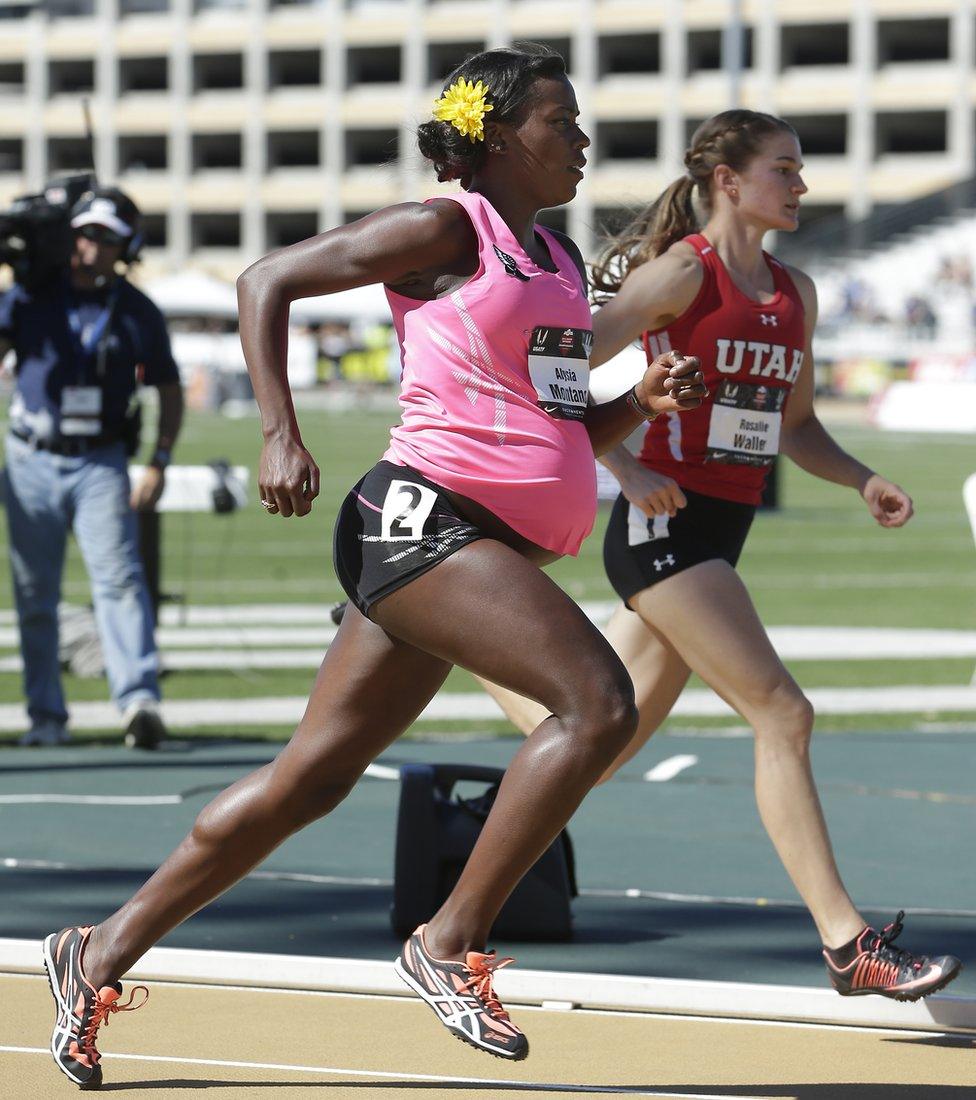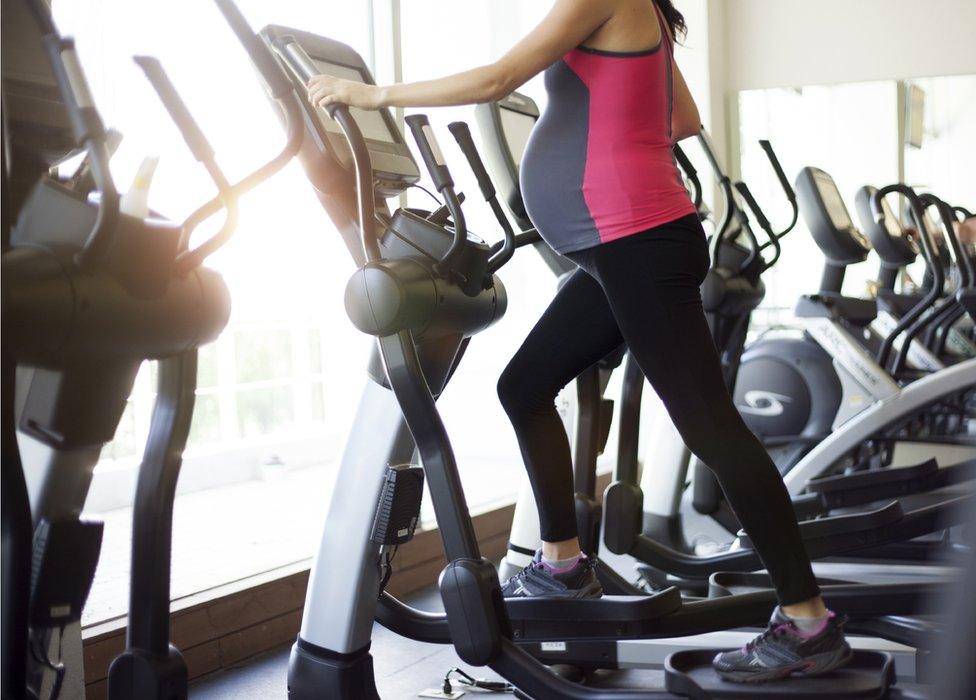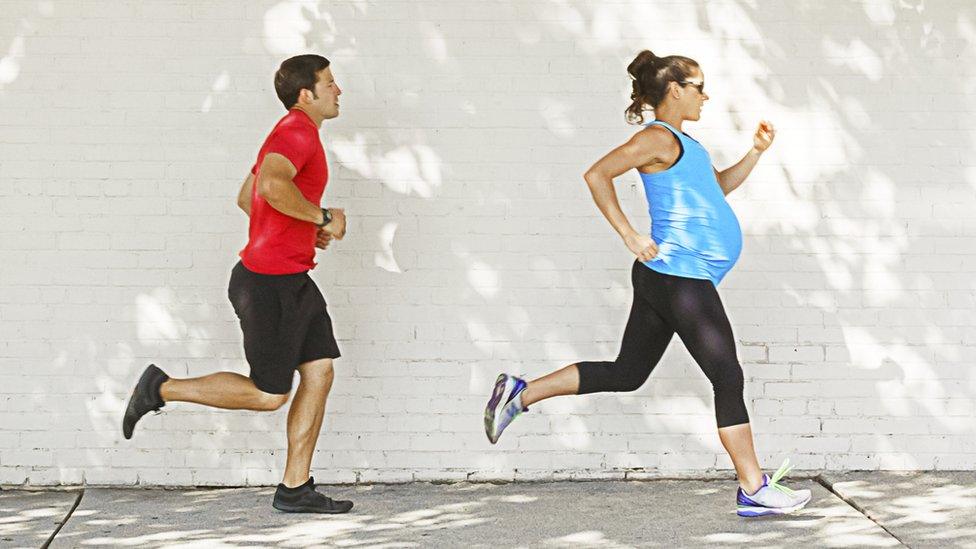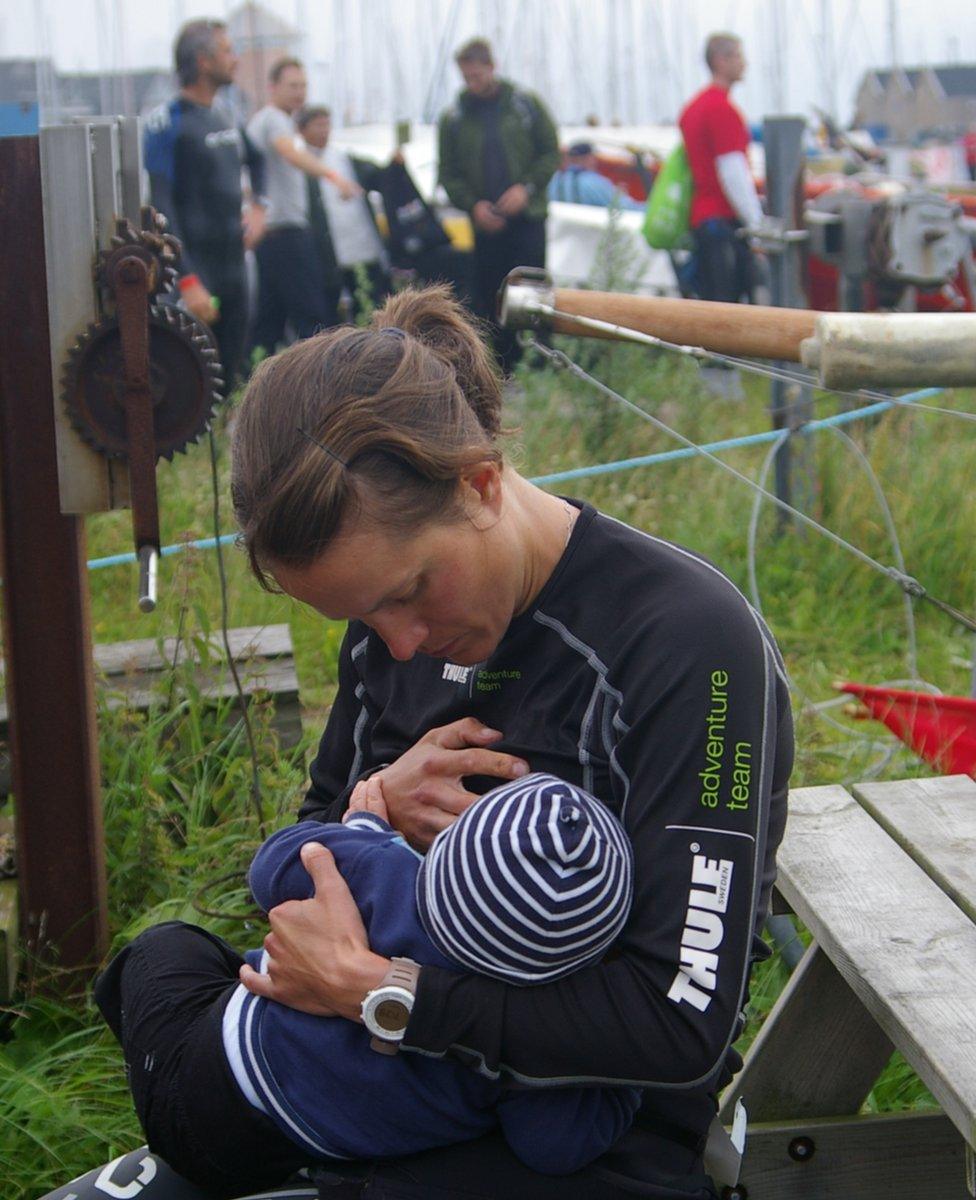Why it's OK to run when you are pregnant
- Published

Many top sportswomen continue training - and even competing - after they get pregnant. A new report commissioned by the International Olympic Committee confirms there are fewer risks than you might think.
On 20 March 1983, the Norwegian long-distance runner Ingrid Kristiansen took her place at the starting line of the World Cross Country Championship in Gateshead, England.
For the past couple of weeks she had been feeling a little tired, which she put down to jet lag from two recent trips to the US. She was still one of the favourites to win though, having come first in the Houston marathon a couple of months earlier.
But to her surprise, that isn't what happened.
"The first lap I was the last of the Norwegians, and my coach didn't understand anything," she recalls. She managed to overtake her compatriots but still finished a disappointing 35th.
"My coach's wife was sitting, looking at the television. And she called her husband afterwards, and she asked him, 'Is Ingrid pregnant?'
"I think it was the way I was running. Maybe I was a little bit heavier in the upper body, I'm not sure. But she saw it."
Kristiansen soon confirmed that she was pregnant - by almost five months. That meant she'd won the Houston marathon pregnant, with a time of two hours 33 minutes.
Female athletes often have irregular menstrual cycles, so it's not uncommon for them to become pregnant without knowing. Over the years, at least 17 women have competed at the Olympics pregnant.
Some of them certainly knew it at the time - a memorable image from the London Games in 2012 is of the Malaysian sports shooter Nur Suryani Taini holding her air rifle over an eight-month baby bump.

Nur Suryani Taini gained a lot of attention at the London Olympics (though sadly no medals)
The cross-country skier Marit Bjorgen, a six-time Olympic champion, attracted attention in Scandinavia last year when she attended team training camps while pregnant.
In June 2014, US news outlets ran remarkable pictures of Alysia Montano competing in the 800m quarterfinals of the US track and field championships (see the picture at the top of this article). In the UK, the media also regularly feature stories, external about heavily pregnant women, external taking part in races.
So how safe is it to train and compete while pregnant? As part of its commitment to women's sport, the International Olympic Committee (IOC) recently called a group of experts to a meeting in Lausanne and asked them to write a report.
Their huge review is being published in five parts in the British Journal of Sports Medicine, external. Despite the complexity of the material, the lead author's message is simple.
"There are only a few high-quality studies into pregnancy among elite athletes or those who exercise a great deal, but it seems that many do continue to exercise during pregnancy, and it does not affect them in a negative way," says Prof Kari Bo from the Norwegian School of Sports Sciences. "It doesn't seem to harm either the foetus or the mother."
These athletes are no more at risk of problematic pregnancies or birth defects, though Bo says that when such things do occur people often mistakenly make a link to physical activity during pregnancy. At the same time, there is no evidence that athletes have an easier time during pregnancy or childbirth.
Historically, advice given to pregnant women relating to exercise has been muddled and speculative. For a long time exercise was simply thought to conflict with a woman's reproductive ability. The roots of this feeling were unscientific, and more to do with gender roles than with the health of mother or baby.

Elite athletes often feel they have to figure out what exercise they should and shouldn't do for themselves
But in the 1980s some researchers began to reason that the demands exercise placed on a woman's body - in terms of oxygen, blood flow, nutrients and temperature - were similar to those made by a foetus. So if pregnant women exercised, these doctors suggested, the foetus might lose out in a battle for resources.
"In a way it's correct," says Bo. "But women who are athletic also have very good blood distribution, so it doesn't seem to do any harm to the foetus, and at the same time it's obvious that the placenta is also better nourished when you are exercising, so there's a sort of compensation going on."
Pregnant women have improved temperature regulation (which is why they may sweat more) and greater cardiovascular capacity. Hormonal changes may mean they feel more flexible in their joints, and an increase in the concentration of red blood cells means they can carry more oxygen around their bodies.
Studies indicate that elite athletes who train during and after pregnancy may see a 5-10% increase in their maximal oxygen consumption in the months after giving birth, though this was not observed in recreational athletes.
Rather than dispensing a list of technical dos and don'ts, Bo has a simple message for pregnant women athletes: listen to your body. If you do something that feels wrong, it's probably best to stop.
"The few studies that we have, they show that pregnant athletes are reducing the intensity and the frequency of training by themselves," says Bo. "This happens when your tummy is growing and you can feel the child jumping up and down with you - it doesn't feel very good."


Pregnancy and training: Four tips
Prof Kari Bo believes women athletes are their own best judges when it comes to training during pregnancy - but she has a few tips:
For the first trimester (12-week period) it's best to avoid getting too hot, so consider wearing light clothing, exercising in air-conditioned environments, and refraining from strenuous exercise on the hottest days
Female weight-lifters should probably reduce the weight they lift, since it may increase blood pressure, stop blood flow to the foetus and strain the pelvic floor
Scuba diving is not advisable during pregnancy, and women in their final trimester may also wish to avoid participating in sports such as football or hockey where they may have a fall or collision
A small study of Olympic athletes showed that blood flow to the foetus was reduced when the mother exercised above 90% of maximal oxygen consumption - in practice this means that moderate exercise in training is fine, but pregnant women should refrain from maximal efforts during endurance training

The new research fits with current advice for the general public. The American College of Obstetricians and Gynecologists recommends that pregnant women participate in aerobic and strength exercises, external, which may reduce the risk of diabetes and improve mental well-being. However, before women embark on an exercise programme, they should seek medical advice.
In the UK, the NHS also advises women to continue exercising through pregnancy, external, though it says they shouldn't work out so strenuously that they can't hold a conversation at the same time.
What counts as "strenuous exercise" clearly depends on how fit you are and how much sport you already do.
Seven or eight weeks into her first pregnancy, the Swedish athlete Eva Nystrom won the Swedish national duathlon - a 10km run, followed by 40km cycle race and another 5km run.
Two days later, Nystrom - who knew she was pregnant - went out for a run and was sick.
"It was like a signal to me that I had to listen to my body, and I had to cool down a bit," she says. "At the beginning I trained and raced too much."
But she continued to run regularly. Nystrom didn't seek medical advice before undertaking her fitness regime - in fact, she didn't even mention it to her midwife, fearing disapproval.
As her pregnancy continued and she put on weight, Nystrom began to have problems with back pain. But luckily there was a particularly heavy snowfall that year in southern Sweden, so, with the encouragement of a physio, she switched her exercise to cross-country skiing, working out for about an hour every other day.

Eva Nystrom skiing a few days before giving birth to her son
She couldn't help noticing, as she approached her due date, that more and more heads were turning to watch her glide by on her skate skis. Nystrom took to training early in the morning, when there were fewer people to cast questioning looks in her direction.
"I did it the last time 24 hours before he was born," she says. "I was a little bit tired, but it was OK."
After the birth of her son Simon (which, contrary to the words of many a midwife, was "not like running a marathon," she says), the baby quickly put on weight. Nystrom says this was just as well.
"I think if he had been a little baby, maybe people would have asked me if it had been a good decision to train. But people didn't say anything."

Find out more
Listen to Prof Kari Bo and Eva Nystrom speaking to Health Check on the BBC World Service
Listen to marathon runner Mary Keitany talking to Sportshour about motherhood and elite sport

After childbirth, women are traditionally told to take it easy for the full postpartum period of six weeks, but Kari Bo says this is something of an arbitrary time period. In reality, athletes who have experienced a straightforward pregnancy and birth often start exercising after one or two weeks.
Back in 1983, Ingrid Kristiansen gave herself just four days of rest following the birth of her son Gaute before she began training once again. A month later she was taking part in cross-country competitions, and before too long came the Houston marathon, which she won with a time five-and-a-half minutes faster than the year before - 2:27:51.
In fact, Gaute's birth signalled the start of the best part of Kristiansen's career, in which she set world records for the Marathon, 10,000 metres and 5,000 metres.

One of the great endurance athletes of her generation, Kristiansen showed that mums could set records
For her part, Eva Nystrom became the long distance duathlon world champion in 2012, the year after giving birth to her son. She is one of a growing list of women athletes - including Brits Paula Radcliffe, Jo Pavey and Jessica Ennis Hill - who demonstrate that, with the right support network, it is possible to organise training and competition around breastfeeding and playtime.
But although the recent IOC-commissioned review is encouraging to athletes who wish to train through pregnancy, Kari Bo admits she often finds herself urging elite sportswomen to take it easier during pregnancy.
"I think women athletes are very, very afraid that they will lose their fitness," she says.
"Most women should be told to be more active, that exercising is safe, it's not dangerous at all, they could start a new lifestyle because they are pregnant.
"Then you have a small group who are addicted to exercise, and they feel that they have to give 100% every time they exercise.
"And to those women I say: 'You do not lose a lot by moderately exercising for the last two months of your pregnancy. This is only a few months in your life, you know? So take care, because you have a passenger.'"

Eva Nystrom feeding her son Simon before competing in a triathlon event about six months after his birth
Listen to Prof Kari Bo and Eva Nystrom speaking to Health Check on the BBC World Service.
Follow William Kremer on Twitter @williamkremer, external
Subscribe to the BBC News Magazine's email newsletter to get articles sent to your inbox.